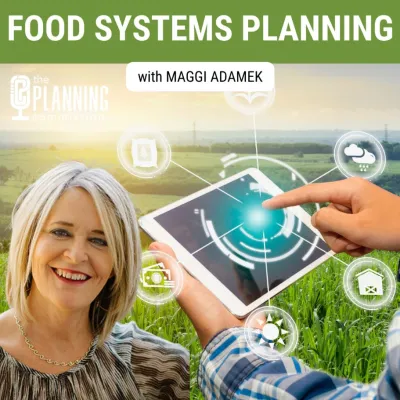Food systems expert Maggi Adamek talks with The Planning Commission Podcast about the complexities of food policy, from local zoning ordinances to international trade agreements.

You’ve probably heard of missing middle housing. But have you heard of missing middle farming?
That’s what food systems expert Maggi Adamek of Minneapolis-based Terra Soma wants planners to consider as they work to create healthier communities. In this episode of The Planning Commission Podcast, Adamek discusses the ways in which food systems and farming dramatically changed after World War II to make growing food more efficient and preparing food more convenient.
This is when the United States moved away from localized food production. Instead, food markets were pushed to the edges, dominated on one end by industrial farming with small-scale, rural, and community food systems intact but unable to feed urbanized population clusters. Thus, missing middle farming.
“Ag policy from the Nixon Administration moved farmers away from producing things that people would eat to growing things like corn and soybeans used for biofuels and feeding livestock,” Adamek said. “You would really have to hunt to get a healthy option outside of your own home. It got to the point where obesity and related dietary diseases rates proliferated.”
That’s when the planning profession started to hear the cry from health professionals. “The planning community, as a whole, really felt a call to action around embedding thinking about access and healthy eating as core components to community design,” Adamek shared.
Planners began asking questions like: How are people going to have access to a grocery store? How are we going to support our farmers’ markets? How do we plan and zone for community gardening space? How do we support the kinds of positive activity that will improve people’s access to affordable healthy food?
These planning approaches, as well as the external influences on food production and food distribution, are discussed throughout the episode.
The Planning Commission is a spirited debate by planners, for planners. This independent outlet for all things planning explores the serious and lighter sides of the profession, poses probing and creative questions to guests, and always pairs the episode guest and topic with a choice libation. Listen to the podcast for a special offer from Planetizen.
FULL STORY: Season 2 Episode 16 Food Systems Planning

Analysis: Cybertruck Fatality Rate Far Exceeds That of Ford Pinto
The Tesla Cybertruck was recalled seven times last year.

National Parks Layoffs Will Cause Communities to Lose Billions
Thousands of essential park workers were laid off this week, just before the busy spring break season.

Retro-silient?: America’s First “Eco-burb,” The Woodlands Turns 50
A master-planned community north of Houston offers lessons on green infrastructure and resilient design, but falls short of its founder’s lofty affordability and walkability goals.

Test News Post 1
This is a summary

Analysis: Cybertruck Fatality Rate Far Exceeds That of Ford Pinto
The Tesla Cybertruck was recalled seven times last year.

Test News Headline 46
Test for the image on the front page.
Urban Design for Planners 1: Software Tools
This six-course series explores essential urban design concepts using open source software and equips planners with the tools they need to participate fully in the urban design process.
Planning for Universal Design
Learn the tools for implementing Universal Design in planning regulations.
EMC Planning Group, Inc.
Planetizen
Planetizen
Mpact (formerly Rail~Volution)
Great Falls Development Authority, Inc.
HUDs Office of Policy Development and Research
NYU Wagner Graduate School of Public Service




























